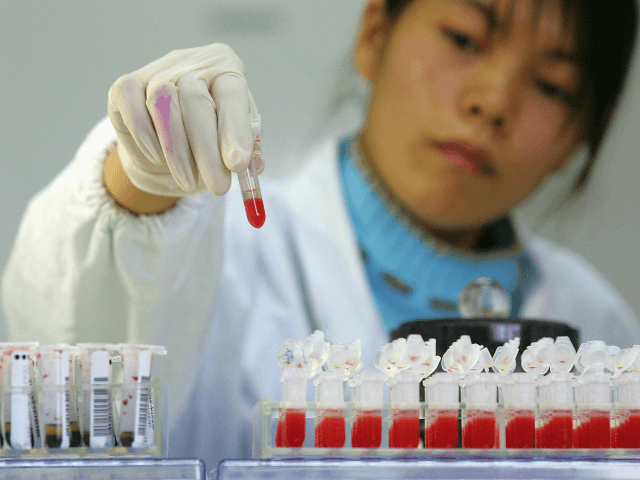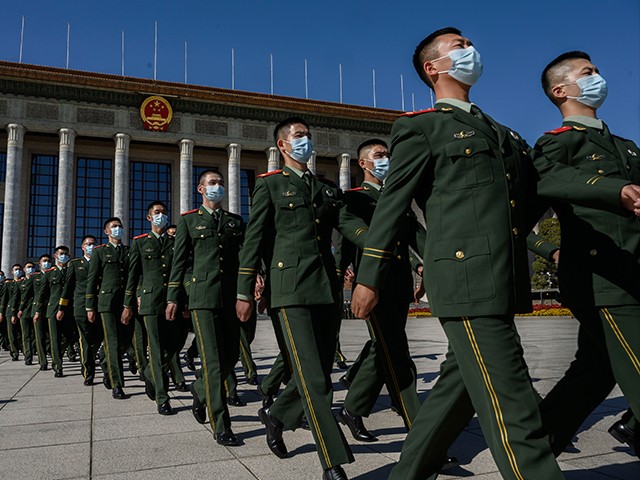Health regulators across five countries are currently investigating a prenatal test owned by the Chinese company BGI for possible violations of local data privacy laws, including allegedly sharing women’s genetic information with the Chinese military for unknown research purposes, Reuters reported Monday.
Health regulators in Germany, Slovenia, Estonia, Canada, and Australia are examining ways in which BGI may have breached domestic data protections by exporting genetic information from prenatal tests to China for unspecified research.
The health officials in recent days “called for transparency in BGI’s use of women’s genetic data, and said even if data was sent abroad, BGI’s local vendors are responsible for ensuring data privacy. The European Data Protection Supervisor said it was monitoring the situation,” Reuters reported on September 6.

A worker performs a CD4 HIV test at a lab of Shanghai Xuhui District Central Hospital on December 6, 2006 in Shanghai, China. (Photo by China Photos/Getty Images)
The prenatal test in question is manufactured under the brand name NIFTY by BGI, a Chinese genome sequencing company based in southern China’s Shenzhen city. NIFTY collects the DNA of women and their unborn babies by screening expectant mothers for more than 80 genetic conditions, including “trisomy conditions such as Down Syndrome from week 10 of pregnancy,” according to BGI’s website. Roughly 8.4 million women worldwide have used NIFTY, which is sold in at least 52 countries.
BGI asks women who use NIFTY outside China to sign consent forms “seek[ing] permission for their blood samples and genetic data to be sent abroad to BGI and used for research,” Reuters noted on Monday. NIFTY’s privacy policy as listed on its official website says the data it collects may be shared for “national security” purposes within China.
“We will never share or disclose your Personal Data without obtaining your consent unless when: It is directly relevant to national security or national defence security,” NIFTY’s privacy policy reads.
BGI issued a statement in July claiming it “has never been asked to provide – nor provided – data from its NIFTY tests to Chinese authorities for national security or national defence security purposes.”
Reuters published an investigative report on July 7 revealing that BGI was collaborating with hospitals run by China’s People’s Liberation Army (PLA) by offering them data obtained from NIFTY tests “for sweeping research on the traits of populations.”
“BGI’s prenatal test, one of the most popular in the world, is a source of genetic data for the company, which has worked with the Chinese military to improve ‘population quality’ and on genetic research to combat hearing loss and altitude sickness in [PLA] soldiers,” Reuters reported at the time.

Chinese soldiers from the People’s Liberation Army wear protective masks as they march after a ceremony marking the 70th anniversary of China’s entry into the Korean War, on October 23, 2020, at the Great Hall of the People in Beijing, China. (Photo by Kevin Frayer/Getty Images)
“One BGI study, for instance, used a military supercomputer to re-analyse NIFTY data and map the prevalence of viruses in Chinese women, look for indicators of mental illness in them, and single out Tibetan and Uyghur minorities to find links between their genes and their characteristics,” according to the report.
“Massive genomic data sets at places like BGI Group (formerly known as the Beijing Genomics Institute), coupled with China’s now-global genetic data collection platform and ‘all-of-nation’ approach to AI, will make them a formidable competitor in the bio realm,” the U.S. National Security Commission on Artificial Intelligence (NSCAI) warned in a prescient report published in March.
“BGI may be serving, wittingly or unwittingly, as a global collection mechanism for Chinese government genetic databases, providing China with greater raw numbers and diversity of human genome samples as well as access to sensitive personal information about key individuals around the world,” according to the report.

COMMENTS
Please let us know if you're having issues with commenting.